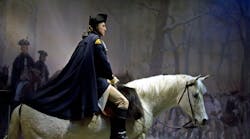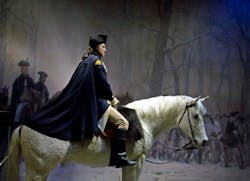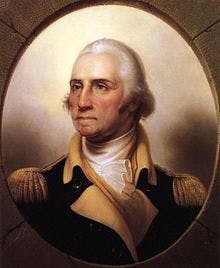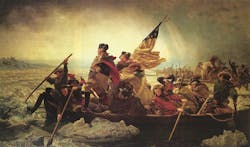November 30, 1776, isn’t an auspicious day in American history.
Indeed, July 4thof that year (and every year since) is far more recognizable, as are other dramatic days that involved the United States, such as August 24, 1814 (when British troops burned Washington, D.C. to the ground during the War of 1812), April 12, 1861 (the battle of Fort Sumter, which began the U.S. Civil War), April 9, 1865 (the surrender of General Robert E. Lee at Appomattox, which ended it), December 7, 1941 (the Japanese surprise attack on Pearl Harbor), or even June 6, 1944 (when U.S., British, Free French and other Allied soldiers hit the beaches at Normandy).
[As an aside, check out the memorial at Chicago’s Midway Airport, opened in 2001 in honor of the Battle of Midway fought on June 4, 1942. You can view photos of it by clicking here.]
November 30 doesn’t contain any of the drama of those and other more famous days for America’s past – heck trucks didn’t even exist back then, so one might wonder why truckers would be encouraged to remember it.Because on that frigid November day 236 years ago several pivotal moments occurred during the then-fledgling Revolutionary War being fought by woefully outgunned Americans against superbly trained and armed British troops and Hessian mercenaries.
On that day, General George Washington stood with the remnants of the Continental Army at Brunswick, New Jersey, having been driven out of New York after a disastrous series of battles against British forces arrayed under General William Howe. Much of the fault for those losses rested with Washington himself, as he made many poor strategic and tactical decisions.
For the British, however, Howe’s uninterrupted string of victories convinced them that the time had arrived to offer the colonists an opportunity for “reconciliation.” So, on November 30, Admiral Lord Richard Howe (William’s brother) released a proclamation that would award full pardons to any and all colonists who would come forth and swear allegiance to King George III.
It met with rousing success as thousands of colonists – particularly throughout New Jersey – jumped at the chance to win a clean slate by abandoning the Revolutionary cause.If that weren’t bad enough, Washington by happenstance opened a sealed letter on November 30 sent between his chief aide de camp and closest confidant, Joseph Reed, and his second-in-command, General Charles Lee.
And oh what a letter it was (you can read about it in David McCullough’s Pulitzer Prize-winning book 1776), basically throwing Washington under the proverbial bus (or perhaps ox cart, considering the time period) by labeling him with a “fatal indecision of mind which in war is a much greater disqualification than stupidity or even want of personal courage.”
On top of all this, Washington knew that on the very next day – Dec. 1 – his small, pitiful force of 5,000 men would most likely become a microscopic, pitiful force as many enlistments periods expired. And his fears proved correct: the next day, 2,000 of his soldiers left the Continental Army’s ranks.
So contemplate the kinds of thoughts churning in Washington’s mind that long ago day for a moment: His second-in-command and closest friend against him due to his poor military judgment; nearly half of his inadequate army on the cusp of leaving; and the British offering full pardons for anyone willing to re-swear allegiance and abandon this silly fight for Independence.
He assuredly knew the personal stakes involved: his Mount Vernon plantation, his wife and family, even his own life hung in the balance. He could secure all of that – and perhaps gain more – by going over to the British. Who would blame him, either? Even a supposedly loyal general and his closest aide committed gross insubordination behind his back. Why not give up?
Yet he didn’t.
Indeed, he did the opposite: and that perhaps is the lesson to be learned here.
The retreat continued, of course, and wouldn’t stop until what remained of Washington's troops were across the Delaware River, the water dividing them from a small hamlet by the name of Trenton, New Jersey. He gained a few additional troops along the way, as well, as forces scattered by the long retreat began to regroup.[Congress grew fearful of all this retreating and so relocated for a time from Philadelphia, PA, to Baltimore, MD. And to think "Charm City" was once our nation's capital, if only for a little while.]
During that grim period, as winter tightened its icy grip upon the land, as November slipped away into December, Washington plotted: not how to give up, not how to get back at friends and subordinates who – in a time of crisis – abandoned him.
Oh no.
Washington instead planned to attack: to deliver a sharp, stinging blow to the overconfident British and Hessians then beginning to embark on what many believed would be a victory lap around the colonies.
That blow would fall upon Trenton, he decided; it would fall on Christmas day – a day certainly no British or Hessian soldier expected to fight. And if the gravity of the situation wasn’t plain enough to everyone at hand, Washington wrote out the password his forces would use during the assault on Trenton with hard slashing strokes of his quill: “Victory or Death.”
And the rest, as they say, is history. And it's a pretty good history, thanks to a decision not to quit when the chips were down.






